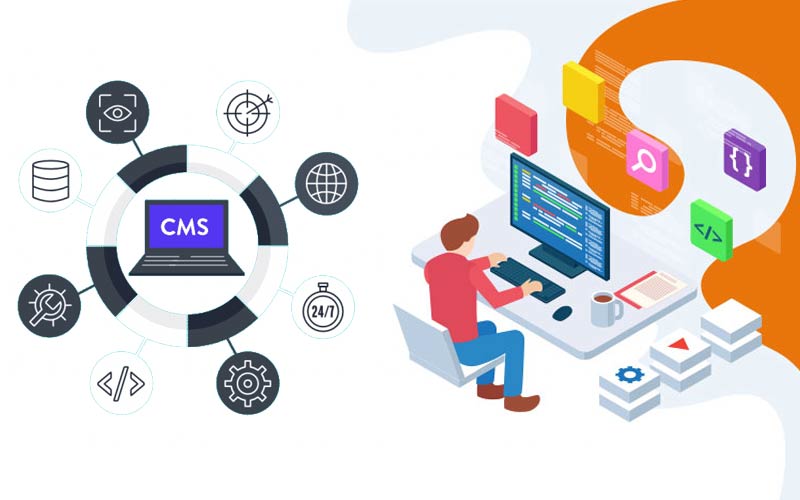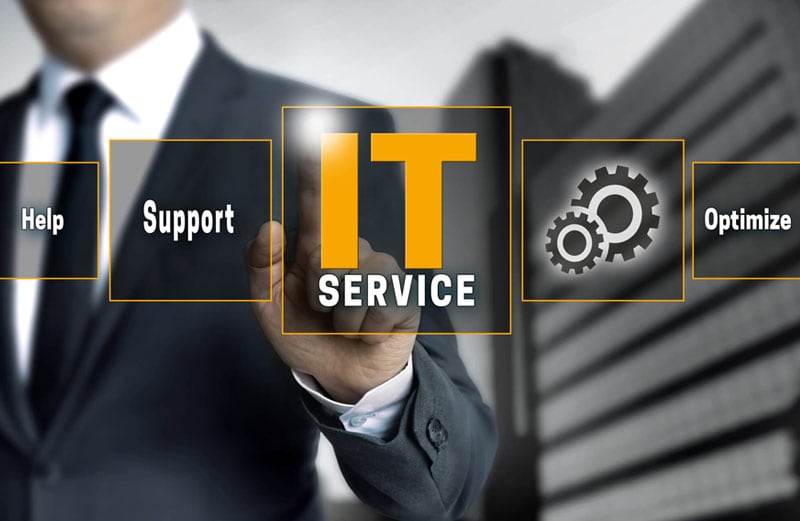Everyone needs a CMS platform to build a website. A CMS platform is helpful to create a website without learning any languages. You will find many CMS platforms where you can create your site. But it also increases your struggle to select the best CMS that fit your needs.
However, your content marketing management is like a chassis of your content marketing campaign. If your CMS can’t display or manage your content right, then the content won’t get the better results. Here in this article, we are going to discuss all aspects of the CMS platform.
What is a CMS platform?
A content management system is a platform that helps you to build your website to manage your content. However, if you want to create a website without the help of a CMS platform, then you have to learn HTML, JavaScript and CSS programming languages and write a lot of codes. If you’re working with a company for web design in Phoenix they will make this decision for you based on budget and goals. Otherwise, you’ll have to choose the right CMS.
CMS platform will allow you to create a website without writing any code or learning any programming language. The work of a CMS platform is to display and manage your content in the right way. However, it does not matter how great your content is because the CMS platform has an impact on your website.
Who are the stakeholders for choosing a CMS?
It is vital to figure out who decides what CMS to use before considering its features. However, it can be hard to figure out a stakeholder. The IT demands a CMS that fits in their current infrastructure stack. Marketing needs something that plugs in their marketing tools. On the other hand, sales want CRM integration.
According to forester surveys, most of the content management platforms fail due to internal politics. So that is why below we have shown some two steps in selecting a CMS.
1. Figure out the stakeholders
Below are the departments that are involved in your CMS decision-making process.
IT
IT is helpful to maintain and modify your CMS. However, it is vital for the success of a CMS deployment.
Marketing
As we know, a content management system is a marketing tool. It is crucial that marketing gives the go-ahead for content marketing.
Sales
If there is a close integration between the CRM and CMS, then it will improve your sake efficiency and effectiveness.
2. You have to prioritize the requirements of the stakeholder
Every process of CMS selection has different requirements. So you have to highlight their specifications in terms of integrations and features. Below we have shown some needs of the stakeholders.
- Must-have is an essential feature the department can’t work.
- Should-have is as vital as a must-have feature, but it is not as time-critical.
- Could-have is desirable, but it is not critical for the department’s functioning.
- Would-have is least pedantic and not appropriate at this time.
Here are the top ten CMS platforms
Let’s take a look at the ten best CMS platforms in 2023
1. WordPress.org
WordPress.org is one of the best CMS platforms on the internet. It is the most popular CMS software that powers around 35% of all the websites on the internet. However, do not get confused between WordPress.com and WordPress.org.
WordPress.org is a free CMS platform that helps you to create a website. However, it designs for blogging, but it can use by all sorts of websites and online stores. However, WordPress.com is a type of blog hosting organization.
Pros:-
- It offers you the freedom and flexibility to build websites like auction sites, online stores and membership sites.
- You do not require any coding language or technical skills to create a website. However, it comes with a WordPress block editor that makes it easy to build great-looking pages on your site.
- You can make money online from your website.
- This platform contains thousands of themes and plugins. You can add all useful extras to your sites such as photo galleries, contact forms and much more.
- WordPress designs to create SEO-friendly URLs, categories and tags of your posts.
- It is an open CMS platform that allows you to join groups like WPBeginner and engage Facebook groups to resolve any problem.
- WordPress offers a lot of extensibility that makes it ideal for both developers and beginners.
- It allows you to download all your content in XML format that makes it easy to move to a different system in future.
Cons:-
- You have to set up your domain and hosting. Moreover, it is your responsibility to manage things like backups and security.
- Sometimes it feels daunting to get started because WordPress offers many options and flexibility. So that is why most of the beginners use drag and drop builder plugins.
2. WordPress.com
It is a commercial and hosted version of WordPress. You will get an all-in-one CMS platform with WordPress.com. However, you can purchase a domain name or a free subdomain with this platform. Below we have shown pros, cons and pricing of this platform that will help you to understand the difference between WordPress.org and WordPress.com.
Pros:-
- You can add and edit content easily with the help of WordPress.com.
- You can build a website free of charge. However, you only have to pay at least for the cheapest plan.
- You will find different themes on your WordPress site.
- You can upgrade to a new plan as your site grows in size. However, it comes with a lot of options involving a plan with e-commerce features.
- It comes with built-in analytics that allows you to see statistics about how many people are visiting your site. Keep in mind that you can’t use Google analytics unless you are on a business plan.
Cons:-
- It comes with a limited amount of monetisation options.
- If you pay for the cheapest plan, then you can’t add a custom domain name.
- With WordPress.com, you don’t have full control over your site.
3. Blogger
Blogger is a CMS platform that is designed for blogging and has been around since 1999. It is a free platform powered by Google. However, it is possible to use your domain name because bloggers have Blogspot in the domain.
Pros:-
- It designs for writing and publishing posts, and you can set up a blog in minutes.
- You can add a contact form and ads on your blog for free.
- You don’t have to update anything or pay for hosting.
- There is no limit on how many posts you can have, and you will have twenty static pages.
Cons:-
- Bloggers will not be the best CMS platform if you want to run an eCommerce website.
- You can modify it a little bit, but you can’t create your themes.
- You have to hire a designer if you need something special.
- If you are deciding to switch from blogger to WordPress, then you have to copy your pages manually.
4. Joomla
It is another free CMS platform that comes with lots of different extensions and templates. However, it is free to use, but you have to buy a hosting and a domain name. Joomla released in 2005 and comes with a lot of features.
Joomla is a platform that is ideal for experienced website creators and developers. Therefore, it is not a better option for beginners.
Pros:-
- It offers flexibility and several other options. So if you are creating something complicated, then it is the best choice.
- Joomla is useful for developers and easy for editing your content.
- It offers lots of community support.
- You can use it to run an e-commerce site.
Cons:-
- You have to hire a developer to help out if you want to do something with it.
- It does not have an option for an additional extension.
- If you have a lot of extensions, then you will face some compatibility issues.
5. Drupal
Drupal is also a CMS platform. It helps to create websites like economists websites and several universities sites. It is one of the best options for developers. If you are deciding to build a highly customised site to handle a lot of data, then Drupal is the best choice.
Pros:-
- It offers flexibility, and it is easy to add content on Drupal.
- This platform comes with a lot of different modules that you can add to your site.
- It offers support through community support options related to other platforms like WordPress and Joomla.
- It comes with a built-in system where you can create new rules and specify their permissions. Moreover, it’s user management is easy.
Cons:-
- It can be tricky to add extensions and figure out how to change the appearance of your site.
- Drupal can be expensive because it contains heavily customised themes.
6. Shopify
Shopify is also one of the best all-in-one hosted CMS platforms. However, in this CMS platform, you don’t have to buy any software, hosting or manage things like backups and updates. Shopify comes with a drag and drop interface that makes it easy to create any website.
Moreover, it supports in-store sales, so if you have a physical store as well as an online store, then Shopify is the best one.
Pros:-
- It has a Shopify integrated payment solution where you can accept credit and debit cards.
- It also comes with PayPal as one of the Shopify’s default payment providers.
- Shopify has lots of extensions and themes.
- If you want to add all sorts of features to your online store, then you can purchase third-party Shopify apps.
- If you make over a certain dollar amount in sales, then there is no need to upgrade it.
- It comes with live chat, email, phone, and Twitter to give 24/7 support. Moreover, it had lots of online forums and documentations.
Cons:-
- If you want to add lots of third-party apps to your store, then your costs can end up high.
- Shopify’s apps are more limited than things like WordPress plugins if you want to add functionality.
7. Magento
Magento is also another best eCommerce platform from the software company Adobe. You can download and install its free version on your web hosting account known as Magento open source.
However, you can pay for Magento commerce if you prefer. It is a hosted platform for you and comes with full support. But Magento can be expensive.
Pros:-
- It is highly customisable and comes with lots of third-party extensions that help you to add more features.
- You can handle lots of customers and products with Magento.
- Without slowing your site, Magento helps to grow your business.
- It has various payment options such as cash on delivery, PayPal and bank transfer.
Cons:-
- Magento might be overwhelming if you want to start an eCommerce website.
- It can be expensive and tricky to hire a developer for your Magento project.
8. Wix
Wix is the most popular CMS platform, but it has some limitations. However, you can switch from Wix to WordPress. Wix is one of the best organisations, and it might be worth considering. Moreover, it also offers a free plan.
Pros:-
- Wix comes with a drag and drop interface that makes it easy to create pages that look how you want.
- There are lots of responsive pre-made templates that look great on mobiles and computers.
- It has a Wix app market from which you can add lots of apps to your site.
Cons:-
- If you have chosen a template, then you can’t change it to another one.
- You have to upgrade to a paid plan to run an e-commerce store.
- It does not allow you to download your data and export it.
- If you want to use a free plan, then you will have a domain and ads on your site that makes money for Wix.
9. OpenCart
OpenCart is also the best CMS platform. If you want to install a robust eCommerce system at low cost, then OpenCart is the best for website builders. It comes with one-click software that makes it easy to install.
However, OpenCart is a free open source CMS that is easy to run and use. It comes with lots of extensions, themes and a robust community of dedicated and commercial support. Moreover, we can say that it is one of the best SEO optimised eCommerce platforms.
Pros:-
- OpenCart has one-click software that makes it easy to install.
- It is the best platform to install a robust eCommerce system at low cost.
- It is a free open source platform that is easy to use and run.
- It comes with lots of extensions and themes that make it easy to add more features.
- OpenCart has a robust community of dedicated and commercial support.
- It offers flexibility and can work with a wide variety of payment gateways.
Cons:-
- It has limited marketing features.
- Most of the extensions have some security issues.
- OpenCart is a buggy platform.
- It is hard to upgrade to the new version.
10. Prestashop
Prestashop is also another eCommerce CMS platform where you can host it yourself. Therefore, you can install it on any web host that supports it.
Pros:-
- It has a large Prestashop community that includes an official forum where you can share tips, tutorials, and lots of other groups.
- If your shop grows, then you have to pay more.
- You can add new features because it has loads of Prestashop modules.
- Prestashop comes with a cheap shared hosting plan.
Cons:-
- It will have a learning curve to begin.
- You have to spend a lot of time getting the best theme that works on your online store.
During the pandemic lockdown, several companies had to adapt online business strategies or shut their doors forever. Organizations have realized that a website can fulfil many business requirements, such as sales, digital marketing, customer retention, and several others.
To achieve all of this, they need to choose a Content Management System that can fulfill these requirements. Most companies feel torn between choosing an open-source or proprietary CMS for their business needs.
Open-source CMS is free-to-use platform that have been developed for public use. Some well-known examples are WordPress, Drupal, Joomla, and Magneto. People using such content management system platforms can access the source code to make adjustments according to their needs.
On the other hand, proprietary CMS platforms get developed by individual companies, and users cannot access or change the source code. But sometimes, the companies provide an Application Programming Interface (API) so that a third-party software can interact with the CMS platform.
One of the easiest ways to decide between the two is to consult a web designing company. They will be able to tell you which is better suited for your business. Lounge Lizard is a professional web designing company that works with both kinds of platforms. They provide content management system integration for their clients as well as additional support. If you wish to learn more about the company, you can access its website here.
How to Choose the Right Content Management System?
But if you are trying to decide things yourself, these are some of the aspects to consider.
Starting Cost
Although open-source CMS platforms are free, you would still need someone to design and manage your website. That will ensure that you can get the maximum use of the different functionalities that are best suited for your business.
Proprietary CMS platforms are available with different price tags and will depend on how much in-house resources are used by the company to develop and maintain them. It will also depend on your industry and how long it has existed.
Running Costs
If you choose a proprietary CMS, you will need to pay a regular fee to the company since you are leasing the software from them. There can be additional expenses if you get other services from them, such as maintenance of your website or integration of third-party software.
You will not have to pay any expenses to use the CMS platform. You may have to pay your web designer to maintain the website, along with other costs of integration. However, if you have a dedicated team for that, then you won’t have to pay anything extra.
Flexibility
With a proprietary CMS, you get tied to the company providing the platform. That means you will have little or no flexibility in terms of making changes to the way the software functions. It also means that you will not be able to switch your CMS platform in case you feel dissatisfied with their services.
But with open-source CMS, you can make an endless number of adjustments since you can access the source code. It is easy to switch your CMS platform as and when required by exporting the content and data. You will also find several web developers who are experts at working with open-source CMS platforms.
Accountability
You cannot deem anyone accountable if an open-source CMS breaks down. However, since open-source CMS platforms have a huge support base of developers, solutions can be found easily. If you have hired a web development company, you can ask them to fix any problems that you have.
Since proprietary CMS software is owned by an individual company, they are liable to fix any problems that you face. However, make sure you choose a reputable company so that you can get proper support from them when required.
Security
Since anyone can access the source code of an open-source CMS platform, they can also find ways to modify or hack it. Therefore, open-source CMS platforms are more susceptible to cybercrimes.
Having said that, open-source platforms also have the support of thousands of developers who are always on the lookout for bugs and security loopholes. Therefore, security updates and patches are quite readily available on the internet.
With a proprietary CMS platform, you would need to find out about their security features and updates before you hire them. Since they do not divulge their source code, they are less susceptible to security issues.
Choosing between open source CMS and proprietary CMS can be a difficult decision for businesses. Even though it may seem that open source CMS has more advantages, they might not apply to your business.
Even if you choose to go with an open-source CMS, make sure that you choose the one that is ideal for your business. If you feel that you are not able to decide for yourself, it is best to take expert advice from a professional web designing company.














